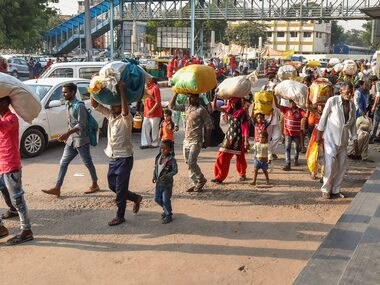More than 300 people across six districts of Gujarat have been arrested for inciting violence against the state’s migrant population, following the rape of a 14-month-old in Himmatnagar district. Fearing a further backlash, migrants are making a bolt for their home states of Uttar Pradesh, Bihar and Madhya Pradesh. While the Gujarat Police insists the exodus is innocuous, what with the fast-approaching festive season, the testimonies of migrants — some of whom have lived in the state for years — tell a different tale.[caption id=“attachment_5341081” align=“alignleft” width=“380”]  Migrants from Uttar Pradesh and Bihar in Ahmedabad seen leaving for their native places. PTI[/caption] But this isn’t the first wave of violence against migrants. In 2008, people from Uttar Pradesh and Bihar faced the ire of Maharashtra’s Shiv Sena that put forth issues of regionalism, language and identity. Akin to that, while Gujarat Congress MLA Alpesh Thakor’s Thakor Sena is being blamed for the ongoing violence in the state, issues of unemployment and rising economic uncertainty are also fuelling the furore. According to Census 2011 data, India has 45.36 crore migrants, most of whom are involved in construction, agriculture, transportation, and the like. Before the introduction of Aadhaar, the ration card was the most basic of identity documents — the access key to healthcare and education. Given the difficulty in obtaining a new one, most migrant workers prefer to have names on ration cards valid only in their home states, automatically removing them from the loop of state benefits. Another observation is that most migrant workers miss out on elections as they lack voting rights in the cities they work. “From a legal perspective, there is no lack of protection in terms of facing violence but the sector is so informal that migrants negotiate on a daily, monthly basis through a network of social constructs,” Mukta Naik, a senior researcher at the Centre for Policy and Research, says. What’s riling Gujarat is the notion that migrants are eating into their jobs, she says. Gujarat has a policy wherein industrial units that avail government incentives have to hire 85 percent of their workforce from the local population. In September 2018, the government had announced it would bring in a law to make this mandatory. Thakor has asked for implementation of this rule. The recent violence, however, has a graver ramification — the politics of identity. “There has been the creation of an acceptable discourse which makes it okay to attack migrants. Identity politics has hit the migrant workforce the hardest and it sends out the message that they are expendable,” labour activist Rakhi Sehgal says. Displaced from their own states with no political patronage or access to state benefits, migrant workers — who form the backbone of India’s informal work sector — are a vulnerable group. There is little legislation to ensure their rights even though India has an Inter-State Migrant Workmen Act which requires — among other things — registration of establishments, rules for contractors, minimum wage for workers etc.
Displaced from their own states with no political patronage or access to state benefits, migrant workers — who form the backbone of India’s informal work sector — are a vulnerable group.
Advertisement
End of Article


)

)
)
)
)
)
)
)
)



